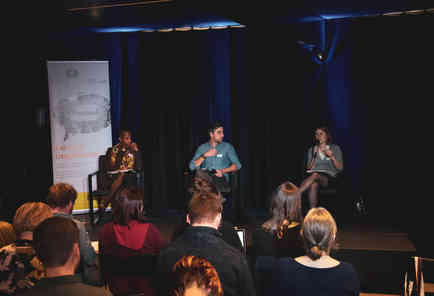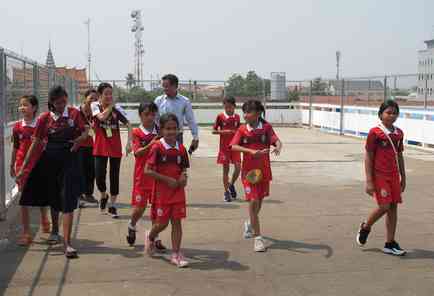Closing the door on 2018, the eNSPIRED team dives into the new year in which our gender adventure continues. Join us and our Rwandese and Cambodians friends on 20 and 21 March to reflect on gender challenges around the world and how to ban gender stereotypes from our classrooms. Find the complete programme and the subscription form below!
Constitutional gender equality in Rwanda
After the civil war of the nineties ended, Rwanda rebuilt a society where at least 30 percent of the decision-making must be executed by women by law, integrating an international gender policy in all government programmes and non-governmental organisations. Thanks to this, the number of women taking up a more prominent role in the community exceeded this quorum by far. Additionally, the government successfully strives to include more girls and young women in education, making Rwanda the top African country on the Global Gender Gap Report 2018, proudly coming in as the sixth most gender progressive country in the world. Yet despite their best efforts, the country seems to struggle with similar gender issues as Flanders.
School-related gender-based violence (SRGBV) in Cambodia
Cambodia has a long history of gender inequality. Traditional gender norms make school-related gender-based violence one of the most important challenges for gender equality in the country. An injustice the government tries to tackle by protecting children’s right to education and placing gender on the agenda of trainings for teachers and school leaders, creating a positive climate for change.
Our guests and education professionals in the spotlight:
- Dr. Philothère Ntawiha, Professor at the University of Rwanda – College of Education (URCE)
- Joséphine Kobusingye, FAWE Rwanda - Forum for African Women Educationalists
- Chantal Dusabe Kabanda, VVOB Rwanda, Education Advisor School Leadership-Diploma Course
- Simon De Schutter, VVOB Rwanda, Financial Advisor
- Satya Roeurn, GADC - Gender and Development for Cambodia
- Maly Sun, VVOB Cambodia, Programme Coordinator Gender and Education
- Chanveasna Chin, VVOB Cambodia, Operations Manager
Join us for an international dialogue on 20 and/or 21 March 2019 in Brussels!
Programme Wednesday 20 March
09:00 – 09:30 Registration and welcome with coffee/tea
09:30 – 09:45 Welcome address
09:45 – 10:15 Gender talks from Rwanda, Cambodia and Flanders - Three compact presentations inform you on the context of the education system and the gender challenges in Rwanda, Cambodia and Flanders. They offer background information to the workshops.
10:30 – 12:30 Choice of 5 workshops, round 1 (see below and attachment)
12:30 – 13:15 Lunch, networking or a visit to the Gender Expo (see attachment)
13:15 – 13:45 Gender talks from Rwanda, Cambodia and Flanders (recurrent session) or a visit to the Gender Expo (see attachment)
14:00 – 16:00 Choice of 5 workshops, round 2 (see below and attachment)
16:00 – 16:30 Creative wrap-up (to be confirmed)
Programme Thursday 21 March
09:00 – 09:30 Registration and welcome with coffee/tea
09:30 – 09:45 Welcome address
09:45 – 10:15 Gender talks from Rwanda, Cambodia and Flanders (recurrent session)
10:30 – 12:30 Choice of 5 workshops, round 3 (see below and attachment)
12:30 – 13:15 Lunch, networking or a visit to the Gender Expo (see attachment)
13:15 – 16:30 Interactive debate 'gender and education: international challenges under the microscope'
Stereotypical ideas on men and women play a bigger role then you might think. They limit the opportunities of and expectations towards boys and girls, in the education sector among others. That is precisely why it is important for teachers to be gender sensitive in the classroom and to learn students to be critical towards gender expectations. In this interactive debate, we invite a researcher, a youngster and a teacher for three thematical talks on international gender challenges. Thereafter, participants and the international visitors search for answers and solutions. Finally, we bring together all the ideas in a plenary discussion.
The panellists:
- Kaj Poelman, policy officer education at çavaria – stand up for holebi’s and transgenders
- Linde Goossens, student at VUB (University Brussels) and member of ChanGE, a Campaign for Sexual Health and Gender Equality, a project of the University Centre for Development Cooperation (UCOS)
- Lieselot Van Gysel, teacher of mechanics, GTI Beveren and ambassador for the European Commission to promote technical and STEM education
Xavier Taveirne, VRT journalist and producer of the documentary ‘Voor de mannen’, will lead the debate.
More details can be found in the attachment below.
Workshops round 1, 2 and 3
- “Integration of gender in education: training school leaders and other education professionals as a key to success.” By Dr. Philothère Ntawiha (URCE) and Chantal Dusabe Kabanda (VVOB Rwanda)
- “Gender equality: gender-responsive pedagogy in early childhood and primary education.” By Joséphine Kobusingye (FAWE Rwanda)
- “Gender clubs: girls and boys try and solve the challenges they face.” By Simon De Schutter (VVOB Rwanda)
- “Gender café and Men Dialogue: informal meetings starting gender dialogues in the community.” By Maly Sun (VVOB Cambodia) and Satya Roeurn (GADC)
- “Gender Action Guide: from school to safe learning environment, a gender responsive transformation.” By Chanveasna Chin (VVOB Cambodia)
Read all about our workshops in the documents below!
Practical
- Wednesday 20 March and Thursday 21 March from 09:00 to 16:30
- Muntpunt, Munt 6, 1000 Brussels
- Teacher trainers, pedagogical counsellors, students, teachers and school leaders.
- Language: English
- Participation is free, subscription necessary (Subscription form below)
Detailed info on the workshops, gender expo and the interactive debate
Educaid.be lunch seminar with Joséphine Kobusingye (FAWE Rwanda) on 22 March
If you are unable to attend the activities on 20 and 21 March, you have a last chance to meet our international guests on 22 March during the Educaid.be lunch seminar. All details and registration via the below link.
Gender and Education in Rwanda: How FAWE Rwanda works towards the improvement of education for all girls
